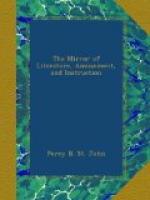if they should reject it. A dagger and a pocket-pistol,
though less openly and ostentatiously disposed than
the arms of the first cavalier, seem ready for the
same purposes; and he, therefore, is repulsed, as
well as his neighbour. These are the only passages
in which the church dignitary might be thought to have
caught for a moment the spirit of the tinker of Bedford.
Through the rest of his parable, which fills a well-sized
quarto volume, the dean no doubt evinces considerable
learning, but, compared to Bunyan, may rank with the
dullest of all possible doctors; ’a worthy neighbour,
indeed, and a marvellous good bowler—but
for Alexander, you see how ‘tis.’
Yet Dr. Patrick had the applause of his own time.
The first edition of his Parable appeared, as has
been mentioned, in 1678; and the sixth, which
now lies before us, is dated 1687.[8]
[6] Parable of the Pilgrim, chapter xxx.
[7] Ibidem, chapter xxxiv.
[8] The Poet Laureate may, perhaps, like to hear that Dr. Patrick introduces into his parable a very tolerable edition of that legend of the roasted fowls recalled to life by St. James of Compostella, of which he himself has recently given us so lively and amusing a metrical version.
Mr. Southey introduces the following just eulogium on our classic of the common people:
“Bunyan was confident
in his own powers of expression; he
says—
—thine
only way
Before them all,
is to say out thy say
In thine own native
language, which no man
Now useth, nor
with ease dissemble can.
And he might well be confident in it. His is a homespun style, not a manufactured one; and what a difference is there between its homeliness, and the flippant vulgarity of the Roger L’Estrange and Tom Brown school! If it is not a well of English undefiled to which the poet as well as the philologist must repair, if they would drink of the living waters, it is a clear stream of current English—the vernacular speech of his age, sometimes indeed in its rusticity and coarseness, but always in its plainness and its strength. To this natural style Bunyan is in some degree beholden for his general popularity;—his language is every where level to the must ignorant reader, and to the meanest capacity: there is a homely reality about it; a nursery tale is not more intelligible, in its manner of narration, to a child. Another cause of his popularity is, that he taxes the imagination as little as the understanding. The vividness of his own, which, as his history shows, sometimes could not distinguish ideal impressions from actual ones, occasioned this. He saw the things of which he was writing as distinctly with his mind’s eye as if they were indeed passing before him in a dream. And the reader perhaps sees them more satisfactorily to himself, because the outline only of the picture is presented to him; and the author having made




